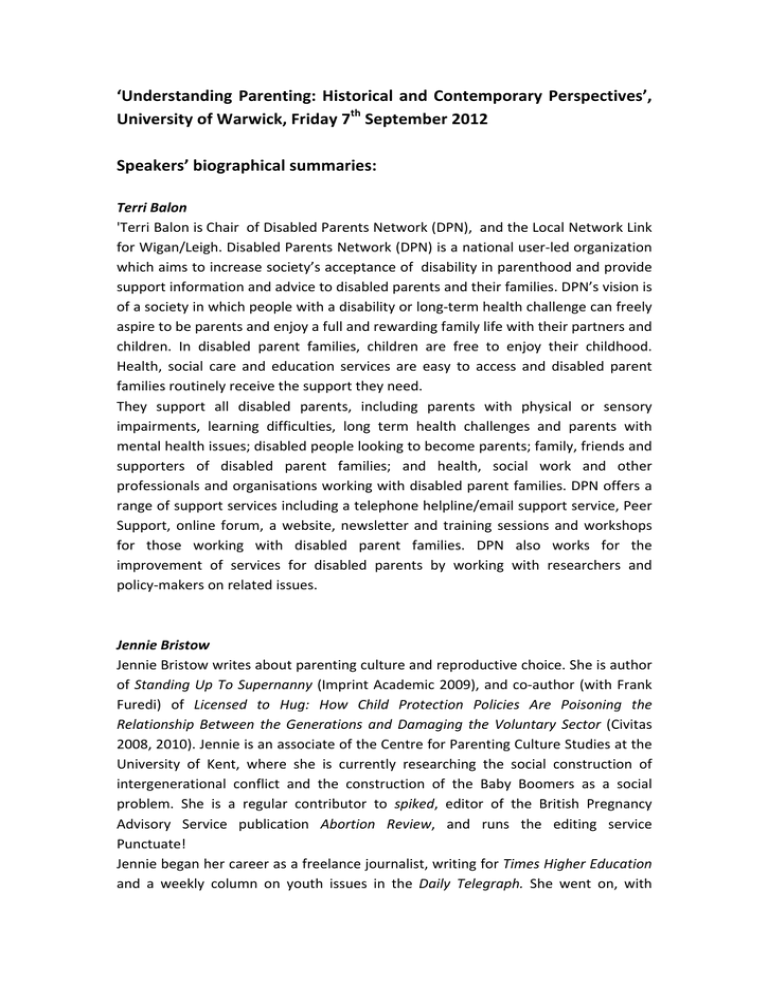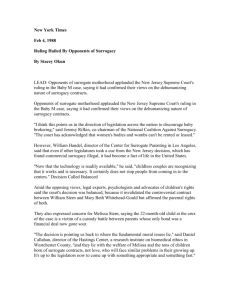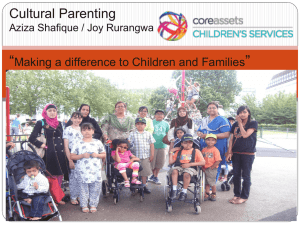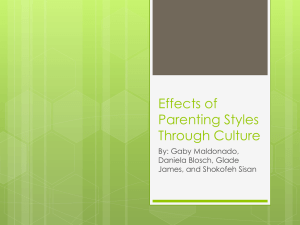Document 12860528
advertisement

‘Understanding Parenting: Historical and Contemporary Perspectives’, University of Warwick, Friday 7th September 2012 Speakers’ biographical summaries: Terri Balon 'Terri Balon is Chair of Disabled Parents Network (DPN), and the Local Network Link for Wigan/Leigh. Disabled Parents Network (DPN) is a national user-­‐led organization which aims to increase society’s acceptance of disability in parenthood and provide support information and advice to disabled parents and their families. DPN’s vision is of a society in which people with a disability or long-­‐term health challenge can freely aspire to be parents and enjoy a full and rewarding family life with their partners and children. In disabled parent families, children are free to enjoy their childhood. Health, social care and education services are easy to access and disabled parent families routinely receive the support they need. They support all disabled parents, including parents with physical or sensory impairments, learning difficulties, long term health challenges and parents with mental health issues; disabled people looking to become parents; family, friends and supporters of disabled parent families; and health, social work and other professionals and organisations working with disabled parent families. DPN offers a range of support services including a telephone helpline/email support service, Peer Support, online forum, a website, newsletter and training sessions and workshops for those working with disabled parent families. DPN also works for the improvement of services for disabled parents by working with researchers and policy-­‐makers on related issues. Jennie Bristow Jennie Bristow writes about parenting culture and reproductive choice. She is author of Standing Up To Supernanny (Imprint Academic 2009), and co-­‐author (with Frank Furedi) of Licensed to Hug: How Child Protection Policies Are Poisoning the Relationship Between the Generations and Damaging the Voluntary Sector (Civitas 2008, 2010). Jennie is an associate of the Centre for Parenting Culture Studies at the University of Kent, where she is currently researching the social construction of intergenerational conflict and the construction of the Baby Boomers as a social problem. She is a regular contributor to spiked, editor of the British Pregnancy Advisory Service publication Abortion Review, and runs the editing service Punctuate! Jennie began her career as a freelance journalist, writing for Times Higher Education and a weekly column on youth issues in the Daily Telegraph. She went on, with colleagues, to launch the online publication spiked, where much of her writing focused on the regulation of intimate life. Following the birth of her second child, Jennie moved to Kent and began working for her PhD, with Professor Frank Furedi and Dr Ellie Lee. Her approach to the parenting question is informed by a long-­‐ standing concern about the impact of policies and cultural shifts that formalise and problematise relations between the generations. Carol Bryce I am in my final year of a PhD investigating how mothers of pre-­‐school children use and privilege information and advice on feeding their children. Prior to embarking on my PhD I have worked in a variety of research environments the most relevant being a project on child safety in a small housing estate in Glasgow and working as the Research Specialist for Nutrition in the national health education agency in Scotland. My current research used a qualitative design as I was interested in mothers’ views on sources of information and advice and how they were used and prioritised. I used a mixture of individual in-­‐depth interviews, paired interviews and mini focus groups to generate data. My presentation will focus on the different ways mothers approach seeking information and advice. Using a discourse analysis approach the mothers in this study fell broadly into one of two discursive positions, either talking of seeking information from a wide range of sources which was actively assessed then acted upon, or they spoke of privileging their own mother’s advice and their upbringing, regarding official sources of information with some degree of mistrust. Mothers in both positions regarded their own instinct as mothers and their uniquely knowledgeable position regarding their individual children as lenses through which all other sources were viewed. Harriet Clarke Harriet Clarke is Director of Doctoral Research/Lecturer in Social Policy and Social Research in the School of Social Policy at the University of Birmingham. She is part of the Families, Policy and Professional Practice Research Group within the School and is interested in the extent to which disabled parents are visible in their own right (and the ways in which parents can be marginalised) within policy and practice. She will speak on social policy research which has focused on disabled parents' experiences, and consider how research and policy agendas may be extended to be more inclusive of the range of issues of concern to many disabled mothers and fathers. Stephen Cullen Dr. Stephen M. Cullen is a Senior Research Fellow at the Centre for Educational Development, Appraisal and Research (CEDAR), the University of Warwick. He has extensive experience of research on family, parenting and school policy practice in England. He is currently a lead researcher in the national evaluation of the CANparent trial, 2012-­‐2014; the Autism Education Trust’s Department for Education (DFE) sponsored AET Programme; and school and children’s centre focused initiatives run by Addaction. He was part of CEDAR’s research team involved in the national evaluation of the Parenting Early Intervention Programme, 2008-­‐2011; the Parent Support Adviser pilot, 2006-­‐2008; and the evaluation of the impact of the DFE investment in initiatives designed to improve teacher workforce skills in relation to SEN and disabilities (SEND), 2008-­‐2011. He has written and co-­‐written 40 reports, peer-­‐reviewed journal articles and international conference papers. As part of the ‘Understanding Parenting: Historical and Contemporary Perspectives’ conference, he will be talking about school based support for parents, including parents of children with SEND, drawing upon CEDAR’s evaluations of the Inclusion Development Project, and the Parent Support Adviser pilot. In particular, he will discuss research issues relating to involving parents in evaluations of school-­‐based policy. Gemma Geldart 'Therapeutic Living With Other People's Children' has been a major archive and oral history project engaging with the history and heritage of residential therapeutic child care between 1930 and 1980. With support from the Heritage Lottery Fund, the Planned Environment Therapy Trust (PETT) worked with former children, staff and family members from five children's communities to record personal histories and preserve the archives of individuals and communities. As the oral historian, Gemma took a lead role in the project's collection of over a hundred life story interviews, mainly working with those (now adults) who experienced this form of residential care as children. In this paper she will discuss the reflections and attitudes of those people with particular attention to the role and relationship of the 'adults' within the different communities. From the perspective of the children themselves and using first hand accounts, she will explore the idea of 'parenting' within these settings, looking at the models adopted and the attitudes towards it. After gaining her degree in Ancient History and Classical Archaeology at the University of Warwick, Gemma completed a practical based MA in Film and Archaeology at Bristol. Focusing on documentary as a way of capturing heritages and modern social history, Gemma developed a passion for oral history, using first hand recollections as a way to complement (and at times contradict) the material record. Her role at PETT has allowed her to further explore her interest in 'people and things', working closely with participants and their stories to help understand and share more of their experience. Janet Goodall Janet first trained in theology, and later in education, obtaining an EdD from the University of Nottingham in 2005. She began to work in educational research, working on the Impact of Continuing Professional Development project. Having come to Warwick, Janet continued to work on that project, as well as working with the NCSL on Networked Learning Communities. She has been involved in a wide range of research, such as that on the funding of education in the UK, on the evaluation of federations of schools and the implementation of workforce reform. She was then lead researcher in the UK on the Beyond Expectations Project, looking at turnaround organisations in Health, Education, Business and Sport. Recently, much of her work has concentrated around parental engagement in children's learning, leading to a report for the DCSF and a literature review for Save the Children, which led the way for the charity's £5 million investment in the UK. She will be leading new modules as both under and post graduate levels next year relating to parenting, and is actively pursuing continued research in this area, including the impact of parents’ religious beliefs on their engagement with their children. Susan Imrie I joined the Centre for Family Research, University of Cambridge, in January 2011 after completing an MSc in Psychology, and am currently working as a Research Assistant on an ESRC funded project looking at the experiences and psychological health of surrogate mothers and their families. Prior to this I worked as a Parliamentary Researcher for four years. The study looks at surrogacy, an increasingly popular assisted reproductive technology, from the perspective of the surrogate mother, her partner and her children. Some of the questions explored in the study, and which will be discussed in my presentation, include how the surrogate mother’s family views surrogacy and whether being involved in surrogacy affects the relationship between the surrogate mother and her own children. From the child’s perspective, how do the surrogate’s children view their mother’s involvement in surrogacy and how do they think it has affected family life? The study also explores whether there is any ongoing contact between the surrogate’s family and the surrogacy child and how the surrogate and her family view their relationship to the child. As there are two types of surrogacy currently practiced in the UK (genetic surrogacy, where the surrogate donates her own egg and is thus the genetic mother of the child, and gestational surrogacy, where the surrogate gestates the couple’s embryo) the study is also investigating whether the experiences of surrogate mothers and their families vary according to the type of surrogacy they have been involved in. Alison King I have been a social worker all my working life – just about 40 years – and for the majority of that time I have specialised in fostering. As a social worker my first priority will always be the welfare of the child, but it is the role of the foster carer which really fascinates me. When I started my career the term was ‘foster parent’, or ‘foster mother’ and ‘father’ and I plan to speak briefly about the history of fostering particularly insofar as the role has changed. Of special interest is the part male foster carers now play in the life of the children they look after – how can men, in particular, build effective and nurturing relationships with children whose experience has left them traumatised and damaged? Does our ‘risk averse’ society allow for good quality loving care? I will also talk about the challenges and dilemmas of parenting ‘someone else’s child’, the legal, psychological and emotional dimensions of the role, and the current move towards delegating authority to foster carers to enable them to make the everyday decisions about children’s lives, from haircuts to sleep-­‐overs. Petra Nordqvist Petra Nordqvist is a sociologist working at the Morgan Centre for the Study of Relationships and Personal Life, University of Manchester; she joined in 2009 after completing her PhD in Women’s Studies at the University of York. Her research explores the intersection of family relationships, assisted reproduction and medical technologies, and gender and sexualities. She has previously explored (in her doctoral studies) the narratives of lesbian couples who pursue donor conception together to become parents. The study focused both on lesbians' material and practical processes of trying to conceive using donor sperm, but also notions of intimacy, connectedness and family shaping the way in which the couples' negotiated and managed the donor conception process. She is currently taking this research further in the ESRC-­‐funded project 'Relative strangers: Negotiating genetic kinship in the context of assisted reproduction' (together with Prof Carol Smart, University of Manchester). This explores how both heterosexual and lesbian couples negotiate sharing information about donor conception with extended family and kin. At ‘Understanding Parenting: Historical and Contemporary Perspectives’ her talk ‘Uncharted territories: Parenthood in the context of assisted conception’ explores some of the complexities that donor conception and assisted reproduction give rise to in families. Doug Simkiss Doug Simkiss is a Consultant Paediatrician and Associate Clinical Professor in Child Health at Warwick Medical School. His particular areas of expertise are children in public care, children with disability and international child health. He is designated doctor for looked after children in Birmingham, was a member of the NICE / SCIE Programme Development Group (PDG) on ‘Promoting quality of life for looked after children and young people’ and is a member of the NiCE / SCIE Topic Expert Group developing Social Care quality standards to promote health and wellbeing for looked after children and young people that will be published in 2013. He is a member of the British Academy of Childhood Disability Strategic Research Group and Editor of the Journal of Tropical Pediatrics. In this presentation, I will discuss a systematic literature review commissioned by the NICE / SCIE PDG and completed by the EPPI-­‐Centre on ‘What outcomes matter to Looked After children and young people and their families and carers; a systematic review of their experiences, views and preferences’. This provides insights into the concerns and experiences of parenting for a vulnerable group of young people in society today. Jennifer Speirs Dr Jennifer M Speirs is an Honorary Fellow in the School of Social and Political Studies at Edinburgh University, a research associate of Innogen, the ESRC Centre for Social and Economic Research on Innovation in Genomics, and a freelance social worker. She received a doctorate in 2008 for her thesis ‘Secretly connected? Anonymous semen donation, genetics and meanings of kinship’ and from 2010-­‐2012 was an ESRC postdoctoral Fellow at the Centre for Research on Families and Relationships at the University of Edinburgh. Her research explored, within a social anthropology framework, the meanings of kinship and the significance of genetics to men who had donated semen anonymously twenty to forty years previously. Her research project emerged from her longstanding experience as a professional social worker with particular knowledge and practice wisdom in origins issues, especially in the areas of adoption, fostering, infertility counselling, health-­‐related social work and the life-­‐long issues for adults brought up apart from their birth families. Jennifer has extensive experience of non-­‐governmental and self-­‐help organisations in the UK, Australia and Aotearoa /New Zealand in employee and advisory capacities, and has provided consultancy to infertility clinics, the media and government departments on social aspects of infertility treatment services, adoption and donor-­‐ assisted conception. Her current research interests include: public and professional strategies and interpretations concerning kinship, parenthood and genetic heritage; social anthropology and social activism; ethnographic methods; and gifts, lineage and Gaelic music in the Western Isles. Fewer modern families than before are said to modelled on an assumed traditional structure of two married parents with children biologically related to them both. Adoption, step-­‐parenting, and surrogacy have increased the number of families in which parenthood is shared, contested, and sometimes legally transferred. In the case of donor insemination, the increasing recognition of the donor as a person has led to fatherhood being described as having become ‘fragmented’, as though it were possible only to have one man standing in the role of father. The ontological view that it is only possible to have one father resulted in the pretence that a social father must also be the biological father and in the suppression or destruction of information about the donor, even when genetic inheritance was growing in importance. Such a view is culturally specific and frequently has been encouraged by medical practitioners providing infertility treatment.





